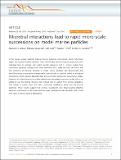Microbial interactions lead to rapid micro-scale successions on model marine particles
Author(s)
Sliwerska, Elzbieta; Datta, Manoshi Sen; Gore, Jeff; Polz, Martin F; Cordero Sanchez, Otto X.
DownloadMicrobial interactions.pdf (817.0Kb)
PUBLISHER_CC
Publisher with Creative Commons License
Creative Commons Attribution
Terms of use
Metadata
Show full item recordAbstract
In the ocean, organic particles harbour diverse bacterial communities, which collectively digest and recycle essential nutrients. Traits like motility and exo-enzyme production allow individual taxa to colonize and exploit particle resources, but it remains unclear how community dynamics emerge from these individual traits. Here we track the taxon and trait dynamics of bacteria attached to model marine particles and demonstrate that particle-attached communities undergo rapid, reproducible successions driven by ecological interactions. Motile, particle-degrading taxa are selected for during early successional stages. However, this selective pressure is later relaxed when secondary consumers invade, which are unable to use the particle resource but, instead, rely on carbon from primary degraders. This creates a trophic chain that shifts community metabolism away from the particle substrate. These results suggest that primary successions may shape particle-attached bacterial communities in the ocean and that rapid community-wide metabolic shifts could limit rates of marine particle degradation.
Date issued
2016-06Department
Massachusetts Institute of Technology. Computational and Systems Biology Program; Massachusetts Institute of Technology. Department of Civil and Environmental Engineering; Massachusetts Institute of Technology. Department of PhysicsJournal
Nature Communications
Publisher
Nature Publishing Group
Citation
Datta, Manoshi S. et al. “Microbial Interactions Lead to Rapid Micro-Scale Successions on Model Marine Particles.” Nature Communications 7 (2016): 11965. © 2016 Macmillan Publishers Limited
Version: Final published version
ISSN
2041-1723